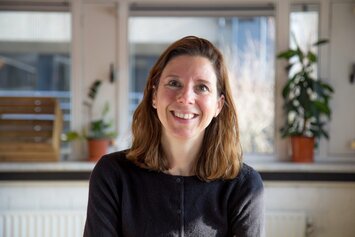Daniëlle, to start at the beginning: can you briefly tell us who you are, where you're from, and what you do in the work field?
I am Daniëlle Arets, born in Limburg and living in Utrecht for a while now. I have been working for almost four years as a lecturer at Fontys Hogeschool Journalism in Tilburg. I also work one day a week at Design Academy Eindhoven. I combine these two jobs within the MindLabs domain by, among other things, doing research into the impact of emerging technologies on journalism.
How exactly do you combine your different jobs within MindLabs?
When a designer starts designing something, he asks himself whether the public is waiting for it. The same is true for journalism. The fact that we can use a lot of new technologies does not mean that we have to use them automatically. It has to add something for the news user or news producer. Within MindLabs we are researching how we can use developments in the field of Artificial Intelligence, serious gaming or virtual reality in a meaningful way. Can we use AI to combat disinformation, for example? How do you reach new audiences with the use of VR or AR? How do you make sure that stories have a better chance of sticking? We try to find answers to these kinds of questions through research projects at MindLabs.
You are therefore a leading expert in the field of journalistic innovation. Where did this interest begin?
Perhaps at Het Klokhuis. I used to think it was a great program, and I still do. Because it makes complex information clear to a broader target group and is constantly looking for new ways to get that information across even better. Moreover, the target group is actively involved in this. To me, that is an essential part of innovation. At MindLabs we try to open up complex knowledge to SMEs, among others, by explicitly including them in the knowledge creation process. The new MindLabs building will soon also be home to programs in which the public can participate in these innovations.
What is your role within MindLabs?
I am part of the expert team. With that team, which consists of professors and lecturers, we develop a program around the MindLabs agenda. In it, we set up research and collaborations for various projects. And I look after the interests of the Smart Media domain.
How long have you been a member of the family and what was the deciding factor; why did you join MindLabs?
Fontys Journalism has been a member since the start of the ecosystem and is also in the slogan, for example: 'MindLabs: Where Minds, Media, Technologies Meet'.
Can you name a concrete project started within MindLabs. What exactly do you do for this?
We have recently started The Editorial Portal. A project in collaboration with 4 Fontys lectorates (Design and Interaction, Big Data and AI, Moral Design Strategy and Journalism & Innovation) and 4 regional broadcasters (Omroep Flevoland, L1, Omroep West and RTV Utrecht). Within this project we investigate the possibilities for a new, smart editorial system by looking at the possibilities of AI. This collaboration is necessary to ensure that we properly combine technical possibilities with desirable and responsible journalism.
You bring a lot of knowledge and expertise to the table. What will this collaboration bring you in the meantime?
More than enough! For example, think of the knowledge that the member universities have and share with us. And there are also several partners who have much more expertise in the field of interactive technology. We in journalism can learn a lot from that.
Are you using your expertise in even more ways?
Sure. For example, for the project 'The Language Amplifier'. A project we set up within MindLabs with the ROC. De Taalversterker is a project that deals with low-literacy and journalism. Here we use technology to automatically adapt texts to a certain language level. In addition, we are developing various modules that allow people to sharpen and improve their language level. For example, we are developing new, visual forms for presenting content. This is how we make news even more accessible.
What do you see as the ultimate goal of your collaboration with MindLabs?
The idea of an ecosystem is that we learn from each other and create knowledge together. The great thing about MindLabs is that it unites schools of applied sciences and universities. This allows us to answer challenges from public and private partners in a practical, applied and fundamental way. It would also be great if we could get students from these knowledge institutes to work together much more.
A feasible plan?
In a certain sense, it is even already happening. Of course you can never serve everyone, but with the projects that are now running within the ecosystem, we see that there is a lot of potential with regard to sharing knowledge. And that is the beauty of MindLabs: they reinforce the added values that different educational institutions have by bringing them together. That's happening now mainly in the field of AI, interactive technology and the human world. And that really has a social added value.

